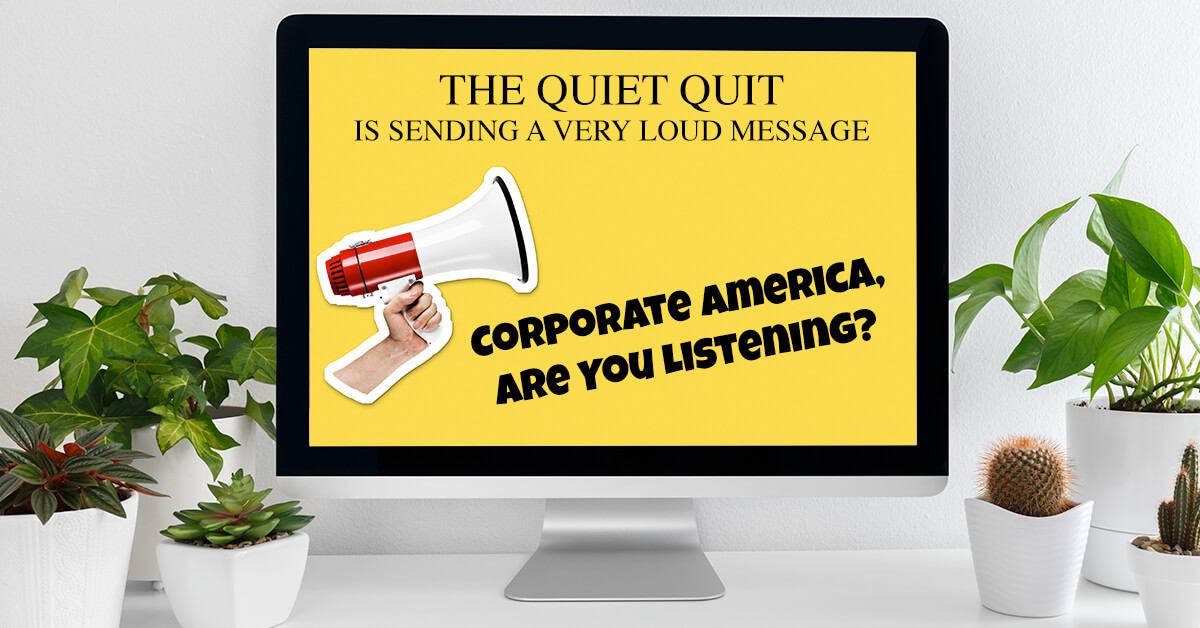The Quiet Quit is all over the news and social media these days. It is where employees have quietly quit doing all the extras they have been doing for years, including working more than a 40 hour work week or an 8 hour day.
To many business owners, managers and leaders, this might seem like a cop out and an immediate criticism of the work ethic of people in the workforce, maybe even general criticism of a certain demographic of people or generation of people.
In some cases that might be true, but if you look at it more closely, I think you will find that it is more about survival, re-establishing mental well being and the beginning of healthy boundary setting.
Survival

We are slowly working our way through living and working during a global pandemic.
In the course of just a few days the way we were used to showing up for work completely changed. The world was shutting down.
Some of us had to learn to work from home, others had to show up for work as usual but had added duties and/or needed to work extra shifts. And for those who have children there was added stress as schools and daycares were closed as well.
People were overwhelmed working from home, while homeschooling children, caring for infants and toddlers, cooking, cleaning, while making sure everyone had the time, tools and materials needed for all of this.
And this doesn’t even include dealing with the reason we were in this shut down, the Covid 19 Virus.
Add illness, death and grief to the equation and we look back and wonder how in the world we were ever able to manage it all?
This was beyond challenging for everyone.
Type A personalities might have been better able to handle the stress of working through a pandemic, but even the most ambitious, positive minded leaders I know, had their struggles too. And because not everyone is type A ,the stress from living and working in this time in history has felt nearly impossible to survive. And many didn’t. And some wonder how much more they can handle.
Many people didn’t have the time to think things through, they had to act and then course correct, over and over and over again until they found a way to manage.
We may be back to work now, and the kids may be back to school, but it is not the same.
We are not the same.
And many of us have not had one minute to reflect on what has happened, because we are expected to get back to work and make up for all that was lost during that time.
So in order to survive, people have chosen to do what needs to be done to keep their jobs, because anything extra could lead to their breaking point.
Mental Well Being

Mental well being is what people are now seeking. And many feel their request for this need is falling on deaf ears. People are not doing well. Not only did many people lose family members to this virus, but they never had the time or opportunity to deal with and process the pain of their grief.
Some people lost their jobs and with that their income. Others had marriages that could not survive.
Some have resorted to unhealthy habits as a way of coping and may now be dealing with the consequences: obesity, addiction, or illnesses directly related to those habits.
Many report, company culture has not changed to meet these needs.
The expectations companies and many managers have are the same or may have even increased because of the need to make up for all that was lost during the pandemic.
Profits Over People?
Mental well being is essential for people to show up as their best selves, however so many are feeling stressed, angry, frustrated, depressed, anxious, sad, exhausted and sick. And they feel like nobody cares, especially no one at work.
So if no one cares, many might wonder, why should they?
Could quiet quitting be a cry for help?
Healthy Boundaries

One of the most difficult things to do in life is to set healthy boundaries.
We are conditioned to help one another, to be selfless, to think of others before we think or ourselves.
And because of this, when we see a need, many of us are happy to pitch in, roll up our sleeves and do a little extra. But there are a lot of times when we feel like others just expect it and don’t appreciate it.
This is when we know it’s time for us to set a boundary to ensure we can feel good about offering help and support to others.
Setting boundaries is challenging because when we set a boundary to keep us feeling good, it often makes others upset or angry. And because of that many of us won’t follow through, and end up feeling resentful, angry and exhausted. This is true in our personal lives and in our professional lives.
At work, we are expected to pull our weight and if there is a weak link, many of us are expected to pick up the slack.
Many positions have been eliminated and merged into one. Where there were once 3 people working in a department, there is now one doing the job of all three, for no more pay or little extra. They are expected to produce the same level of work that once took 3 people or asked to work an hour later, and soon it becomes the norm.
People are not feeling seen, heard, or appreciated for all the “extras” they have been doing or have been demanded they now do.
This is one of the reasons it’s called the “quiet” quit. Because if anyone dares speak up or challenges it, it could mean the end of their employment. So they choose to operate within the professional and legal guidelines quietly doing their job and nothing more and for no longer than what they were hired to do. They are setting a boundary. They are saying that doing any more than what is required is no longer in my best interest.
And when it comes to mental well-being they realize setting healthy boundaries is a necessity.
What Just Happened?
We have come to a point where many people have felt like they are emerging from living in a fog. They did what they had to do to survive. But now that the fog is clearing, they realize they need some time and/or space to process and heal any issues they were dealing with during the pandemic.
They can’t just pick up where they left off and be expected to keep moving forward.
But for some, the load has been too heavy to take another step.
This heaviness is not only taking a toll on our health and mental well being, it’s costing many of us our marriages, relationships, or our jobs.
This reminds me of a friend who once told me, she rejected a contract offered to her because of a work schedule issue. She said “a job can’t love you back” and because she wanted to work and be able to spend time with her husband and they wouldn’t budge, she chose the one who could love her back. She has since found a job that allows her that balance.
And now others are realizing this too.
Now What?

Something has got to give and the price is too high to pay if it doesn’t.
People are feeling as if they have to choose one or the other, and they know they can’t.
So the only way they can think to make it work, is to quietly quit doing all the extras so there is some time for them to breathe and heal.
People seem to be saying they want to find a way to achieve work- life balance instead of participating in the grind and hustle.
Can this be a win-win situation?
Corporate America, are you listening?
Are you willing to have an open and honest conversation about it?
Can people feel safe as they address their concerns?
You have to get the conversation started so solutions can be found that can work for everyone.
Want to learn more about how we can partner together to find solutions that help? Let’s set up a time to chat.



